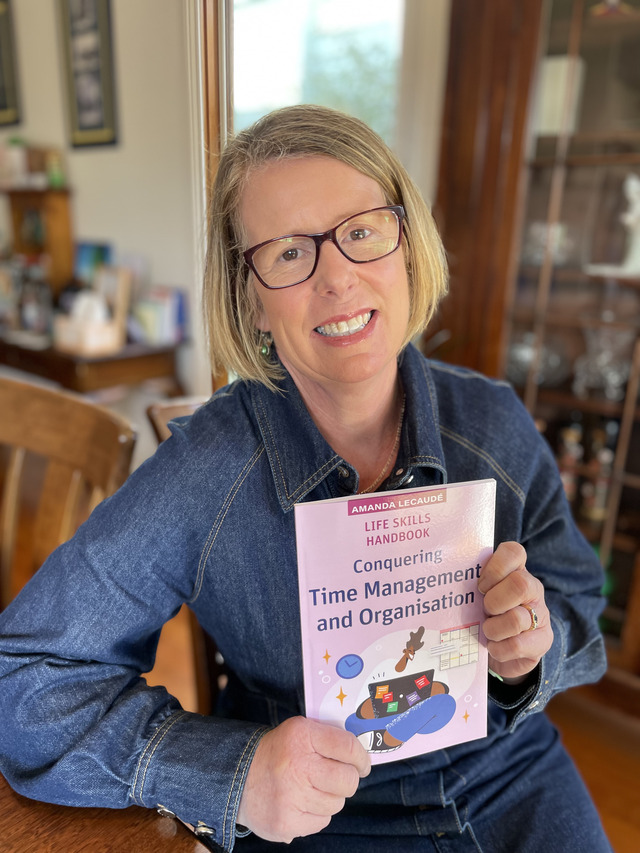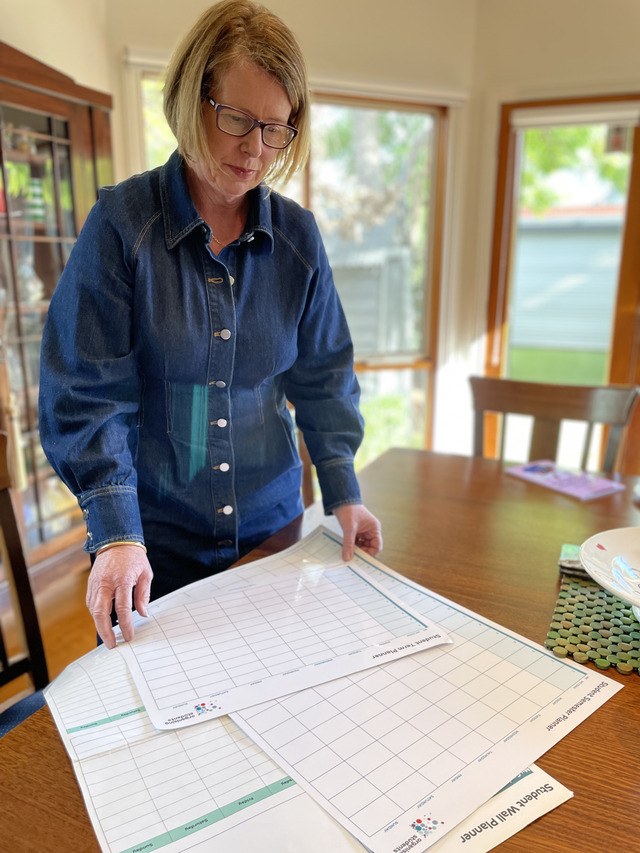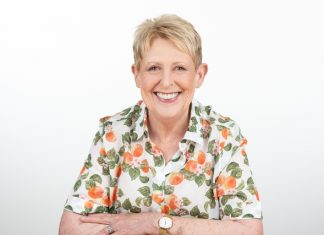By Casey Neill
A Moonee Ponds mum is on a mission to teach kids to manage their time and tasks.
Amanda Lecaude is an academic life and executive function coach. Put simply, she’s an organisation and time management whizz who gives others the tools to tame their sloppy ways.
She started a business offering general organising in homes and businesses, but 10 years ago pivoted to helping students from Year 6 to university and hasn’t looked back.
Her top tools for parents who want their children to be more organised?
Analogue clocks.
“In order to manage time, you’ve got to see time passing,” she said.
“If you can’t see time passing you’ve got no awareness.
“You have to see that time has a beginning and a middle and an end to manage it.”
Amanda also recommended family planners and said timers had an important part to play, especially around device use.
“I put a timer in place for my children so they could see that time passing,” she said.
Her sons, now aged 18 and 21, exposed her to bullying, school refusal, and alternative learning pathways.
“My experiences help me to help others,” she said.
“I don’t want to have to have gone through them, but it’s been really useful.”
Amanda has just released her book Life Skills Handbook: Conquering Time Management and Organisation.
It’s aimed at secondary school students but the concepts are applicable across all age groups.
Parents can start helping their children to better manage their time from any age.
“One of the things I also talk a lot about is executive functions,” Amanda said.
“We all have executive functions. We’re not born with them. They develop.
“They’re things that control our planning, our prioritisation, our memory, our time management.
“That part of the brain doesn’t finish forming until the age of 25.
“That doesn’t mean you can’t learn and teach these things along the way.
“It’s trying to educate this younger generation coming up so we can move away from some of the negativity we grew up with – that you were just dumb or just lazy.
“Kids don’t set out to not do well, they don’t set out to fail.
“They don’t set out to be difficult.
“They might not have the right tools or know what it is they need to do.”
So how can parents equip their children with the right tools?
“One of the things we do is we’re always very busy issuing directions,” Amanda said.
“All the kids are learning is to take directions.
“One of the things I say to parents is to take a step back and change the way you approach it.
“Ask ‘where do we need to be, what time do we need to be there, what do you need to have with you?’.
“This sets a really solid foundation.”
Amanda has identified 15 steps between a teacher issuing homework to a child handing it in.
“For most kids, you get it, you do it, you hand it in. You don’t even think about it,” she said.
“But kids can get stuck in any one of the 15 steps.
“I have kids that will do the homework but not hand it in.
“We need to identify where they struggle so we can provide the tools and strategies to manage it.”
Amanda and her team assess each child they assist and adapt their program to their needs.
“We look at everything from desk setup to eating habits, sleeping habits,” she said.
“What we’re trying to do is make a difference to these kids’ lives.
“You’ll hear parents and teachers say they’re just lazy.
“They’re generally not lazy, it’s just that they don’t have the right tools or strategies to do what it is they need to do.”
Parents often don’t know how to help because they never learned the necessary skills.
“I don’t think we teach this stuff well enough in schools,” she said.
“We have career people in high schools. I think there should be someone who does what I do, to support students.
“We’re seeing a lot more anxiety, stress, mental health issues, and overwhelm.
“If they can break it down and make things more manageable and easier, it makes a massive difference on that front.
“What I’m seeing more of is perfectionism.
“That is really impacting kids’ ability to function.
“If a child does their best, you can’t ask for more.”
Amanda said the transition from Year 6 to Year 7 was the most pivotal to support kids through.
“Not only is there so much change but kids are going through puberty at the same time so there’s a lot going on,” she said.
“My advice to parents at that stage is just let your kids be engaged and happy and want to go to school.
“Don’t worry about the academics, that will come later.”
Visit www.organisingstudents.com.au for more information.








